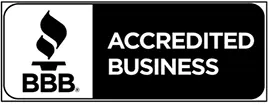There are any number of reasons your garage door could be making excessive noise. Some noise is to be expected, but if you’re suddenly hearing more noises than before, there are a few basic things you can try before calling for help.
Tighten Nuts and Bolts
Make sure all your hinge and track bolts are secure. Use a socket wrench to tighten up any loose nuts and bolts but don’t overdo it. A firm tightening is all that’s needed. Don’t mess around with any components involving the springs including brackets, cables, wood blocks, fasteners, bolts or other parts of the counterbalance system. If you’re not sure, leave it alone and get help from the pros. Knocking the spring out of balance can lead to more problems and be dangerous.
Lubricate Rollers
If your rollers are the standard open bearing type (not upgrade enclosed nylon rollers) you could give them a little squirt of lubrication. We typically recommend lithium grease or a silicone spray but don’t use WD-40.
Lubricate Hinges
Hinges can be subject to corrosion or dirt build up causing unwanted friction in the system which in turn makes noise. While you’re doing the rollers, you may as well give all hinges a squirt as well. Again, lithium grease or silicone spray but no WD-40!
Lubricate the Garage Door Spring
Noisy or not, it’s a good idea to lubricate your springs one or twice a year. Not only will it reduce noise, it will prolong the life of your spring. Take your lithium grease and spray across the top of the spring. Apply just enough that it seeps down but doesn’t drip all over the floor below. Wipe away any excess if needed.
Still Noisy?
After tightening your nuts and bolts and lubricating the components mentioned above, open and close the door a couple of times. If you’re still hearing unusual noises, it may be time to call in the pros for a more detailed inspection.











